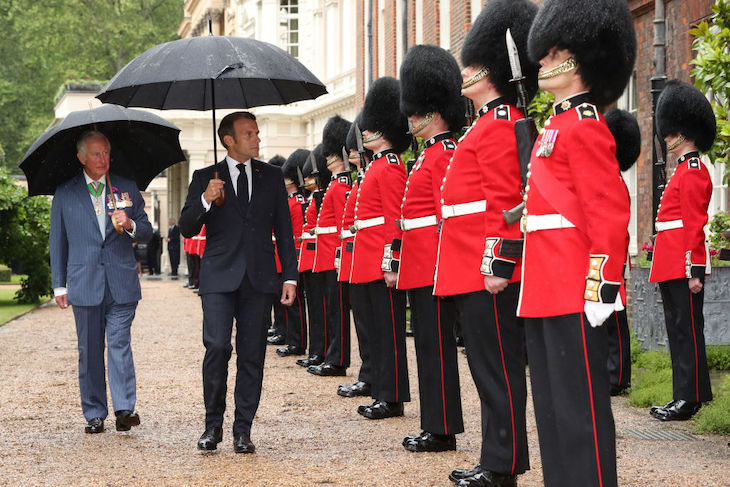As King Charles’ state visit to France begins, it is clear that France is not as republican as it claims. The death of Queen Elizabeth II in September 2022 gave way to an outpouring of French national grief. Speaking for his people, President Emmanuel Macron tweeted: ‘Her death leaves us with a sense of emptiness’. On 19 September, seven million viewers watched the state funeral live on six French television channels, an audience share of 66.7 per cent.
One might of course say that it was Queen Elizabeth’s exceptional qualities as a human being, her unfailing devotion to duty, that were being acknowledged rather than her status as monarch. Yet French audience figures for Prince Philip’s funeral in April 2021 were also seven million and for Princess Diana in 1997 it was ten million.
In this popularity, there is a French wistfulness for a regime other than the present republican system
At the heart of this is a French fascination with royalty in general, and British royalty in particular. On the eve of Charles’s coronation in May, according to the French travel search engine Expedia.fr, searches for London hotels that weekend increased 435 per cent.
The French attitude is awash with paradox and ambiguity. The first of these is that after more than a millennium of monarchy, the French executed their sovereign, Louis XVI, in 1793 during the French Revolution. But lest we forget, so did England in the seventeenth century.
Just like England, France also restored her monarchy. In 1814 the Bourbons returned and France would continue to live under royal tutelage until 1870 – excluding a four-year interlude from 1848. Even when the republic was proclaimed anew, after the humiliating defeat and capture of Emperor Napoleon III by the Prussians in 1870, the regime was not popular.
It was largely because French monarchists were divided among themselves over which branch should reign that the republic became established by default. Even under what became the early Third Republic, pro-monarchist parties continued to be elected and, but for their divisions, might have gained power in 1877. But, as one of the leading French politicians of the time, and no natural republican, Adolphe Thiers stated, republicanism is ‘the form of government that divides France least’. Yet to this day descendants of the three branches of the French monarchy (Bourbons, Orleanists, Bonapartists) occasionally surface in the many French royal-watching weeklies.
Even with the republican regime firmly in place, two other monarchist moments occurred, this time involving Britain. The first was in the spring of 1940 as the German armies advanced rapidly towards France. Prime minister Winston Churchill proposed to his opposite French number Paul Reynaud a Franco-British union, through which the two states would merge their two empires under the sovereignty of the British crown. Though at first taken seriously in Paris, the offer was finally rejected by the new Pétain government which had other plans. The second was in 1956 on the eve of the Franco-British Suez expedition when Paris made a similar proposal to London again involving the British sovereign that this time was rejected by Britain.
The French fascination with royalty continues to this day – albeit nuanced. According to a September 2022 poll in Le Figaro, 71 per cent of respondents said they had a positive view of the British royal family. The reason for this success was that for 80 per cent of the respondents the royal family was the incarnation of British values and 67 per cent found them sympathetic, while 70 per cent considered them close to the British people. Here we sense a French wistfulness for a regime other than the present republican system, where the head of state is an openly political figure and ipso facto a divisive force. For a nation so easily divided, it seems the republic is not the panacea Thiers thought it to be.
But does that make the French monarchists? The Figaro poll showed that 38 per cent of French respondents said monarchy ‘makes them dream’. This is an ambiguous statistic reflected in the fact that 55 per cent believe that monarchy is not adapted to today’s society, while on the contrary 44 per cent judge it to be ‘timeless and still adapted to today’s society’. Of particular significance is that amongst French under 35s monarchy is more popular (52 per cent) than amongst the over 65s (36 per cent).
One must imagine that French enthusiasm for monarchy is a vote-winner, because Emmanuel Macron is making such a big thing of King Charles and Camilla’s state visit to France this week – with a state banquet in the Hall of Mirrors in the Palace of Versailles thrown in and all. Some wags have already commented how Macron has often seemed to be more royalist than the King. Others, more threateningly, suggest he should beware the fate of Versailles’ last royal inhabitant.
Got something to add? Join the discussion and comment below.
Get 10 issues for just $10
Subscribe to The Spectator Australia today for the next 10 magazine issues, plus full online access, for just $10.



















Comments
Don't miss out
Join the conversation with other Spectator Australia readers. Subscribe to leave a comment.
SUBSCRIBEAlready a subscriber? Log in